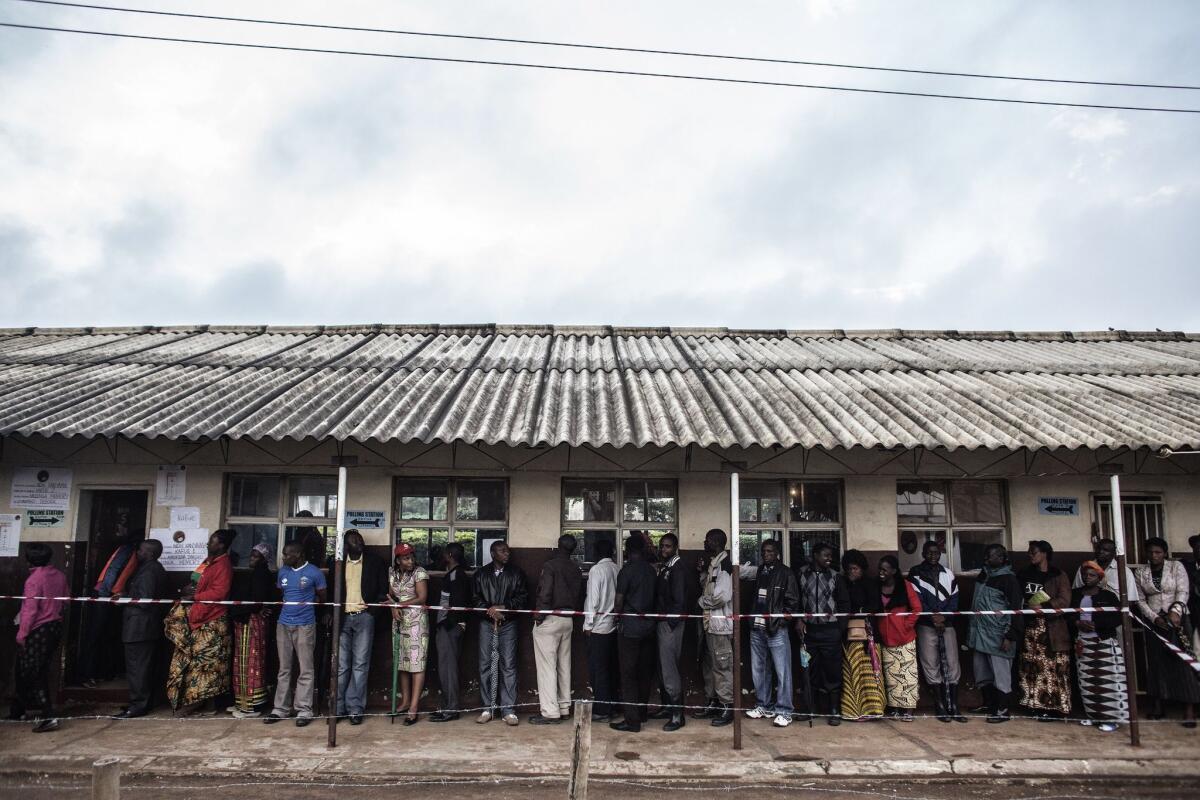Zambians vote in a special election to replace President Michael Sata

- Share via
Reporting from Johannesburg — Zambians voted Tuesday in a special election to replace President Michael Sata, who died in office in October after a long illness kept secret by the government.
Sata’s death unleashed ugly power struggles in the governing Patriotic Front party and the southern African country’s biggest opposition party, the Movement for Multiparty Democracy, both of which had to be resolved in court.
In the Patriotic Front, the acting president, Guy Scott, a white Zambian of Scottish descent, battled the minister for defense and justice, Edgar Lungu. The two factions held separate conferences to select a candidate in Tuesday’s vote, with Lungu emerging as the winner after the conflict went to court.
The Movement for Multiparty Democracy, Zambia’s largest opposition party, was in office for two decades until 2011, when Sata and the Patriotic Front took power. But the party split over its candidate in this election, initially selecting former President Rupiah Banda, a move challenged successfully in court by party leader Nevers Mumba.
Earlier this month, Banda stunned members of his party when he endorsed Lungu as president. Other party heavyweights endorsed economist Hakainde Hichilema, leader of the United Party for National Development and viewed as Lungu’s main rival.
There are 11 candidates, including one woman.
Opinion polls are not considered reliable in Zambia, making it difficult to predict a winner in the tight race. The next president will govern only until elections due in September next year.
Voting started late in many areas Tuesday because ballots did not arrive on time. After casting his vote Tuesday morning, Hichilema claimed that the late voting materials were a sign of fraud.
“Why are there no ballot papers in our strongholds? Someone is scheming around. It’s fraud,” Hichilema told journalists.
The Zambia Electoral Commission blamed rainy weather for the distribution delays. Ox carts were used to deliver ballots in some remote areas. In others, electoral commission staff had to deliver voting materials on foot.
Whoever wins this election will face economic challenges because of the falling price of copper, which accounts for more than 80% of exports, mainly to China.
Zambia is one of Africa’s biggest copper producers, with friction between Chinese mine owners and employees. Sata exploited anti-Chinese sentiment in his election campaign but toned down his approach after taking office.
The Zambian government increased royalties on copper open pit mining from 6% to 20% earlier this month, in a move Hichilema said was nonsensical at a time when global commodity prices were tumbling.
Zambia’s Chamber of Mines has warned that nine of the country’s 11 biggest mines are running at a loss and the tax hike could cost 12,000 jobs. Mining unions also oppose the increase.
About 60% of the 15-million population live in poverty, according to the World Bank.
Hichilema, 52, has said the tax hike could see investors move to the Democratic Republic of Congo, which overtook Zambia as Africa’s largest producer in 2013. He campaigned on the idea that as an economist, he knows how to create jobs.
“When your car has a problem you go to a mechanic. You need an economist like myself to fix the economy,” Hichilema said at an election rally Monday.
Lungu, 58, cautious and softly spoken, lacks the brash popular appeal of Sata, who was nick-named “King Cobra” for his acid tongue. But he built his campaign on the idea of continuity of policies that had made the late leader popular, including sharp increases in public servants’ wages.
He promised to cut fuel prices, reduce the price of the staple maize meal and improve service delivery.
“Michael Sata is still in the Patriotic Front. We shall honor him to the letter,” Lungu said at his final campaign rally.
Lungu has faced accusations that he is not healthy enough to be president, with former Patriotic Front lawmaker Sylvia Masebo, who defected to the United Party for National Development, challenging him and other candidates to submit to health checks. Two previous presidents, Sata and Levy Mwanawasa of the Movement for Multiparty Democracy, both died in office.
Lungu countered that he was in good health and not afraid of a health check.
In 2011, more than 2.7 million of the country’s 5-million registered voters cast ballots. Some are predicting the turnout will be lower this time, because of the rainy weather in many areas.
Results are expected Thursday.
For news from Africa, follow @RobynDixon_LAT
More to Read
Sign up for Essential California
The most important California stories and recommendations in your inbox every morning.
You may occasionally receive promotional content from the Los Angeles Times.












